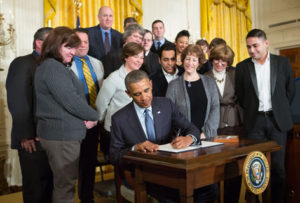I have previously blogged about the new Department of Labor (DOL) Overtime Rule that is set to go into effect on December 1, 2016. Put simply, the rule will require many employees paid a salary of less than $47,476 to be paid overtime at a rate of time-and-one-half for all hours worked over 40 in a given week. Currently, many employees who are paid a salary of at least $23,660, and meet other job duty requirements, are exempt from overtime pay.
On Tuesday, Judge Amos L. Mazzant III, a United States District Court Judge for the Eastern District of Texas, issued a preliminary injunction preventing the DOL’s rule from going into effect. The Judge partly found the rule cannot take effect because the increased salary basis amount of $47,476 was too high. The Court found the DOL must base the overtime exemption requirements on numerous factors, such as meeting certain job duties (see here). However, by increasing the salary basis minimum to the amount that it did, the DOL changed the overtime exemption test to a “de facto salary-only test.” Keep in mind, Judge Mazzant only granted a preliminary injunction, which may change when it comes time for the Court to make a final determination on all the evidence produced during discovery and trial.
As of this second, the overtime rule will not go into effect December 1, 2016, and the current overtime exemption tests remain in place. This includes the $23,660 salary basis requirement for certain types of employees. The Department of Labor is almost certain to appeal the Court’s order. This firm will keep everyone up-to-date on any appeals, decisions, or legislation affecting the ability for workers to earn overtime compensation at their jobs.


 What’s the Problem?
What’s the Problem?